FAQ
NetPetro was created exclusively for oil and gas industry professionals and taking into account all the specifics of implementing oil and gas projects.
Possibility of creating an open profile. The entire profile in one link (QR code). Use as a signature in your business correspondence, on business cards, or anywhere else to promote and develop your career.
Thanks to the 7I standard (7 core areas describing professional qualities and experience), it is ensured:
- The most complete representation by experts of their business profile, taking into account all the strengths of expert skills and work experience;
- Search for experts, taking into account detailed requirements for technical skills, management and leadership skills, work experience (financial indicators, completed projects, managerial scale, etc.).
Features of NetPetro when creating an individual profile according to the 7I standard:
- Detailed representation of the level of technical skills (more than 50 key disciplines and more than 1400 key skills in the oil and gas industry), A unique set of professional competencies allows you to:
- employers can quickly find experts in each specific discipline,
- present specialists in detail their area of competence;
- Accounting for management and leadership experience;
- Accounting for financial indicators of influence;
- Accounting for management and leadership qualities;
- Detailed description of implemented (participation experience) projects;
- Achievements.
A Public (Open) Profile is your personal website that everyone can see. Using an open profile allows you to increase personal business efficiency.
Your personal achievements, experience, and professional skills are always visible, which ensures more successful career growth.
There is no longer any need to use a resume format with a limited amount of information to suit someone’s requirements. The full amount of information about you can be publicly available via one link (QR code). They will find you, they will appreciate you, and you will be offered the best job worthy of you.
Use the link (QR code) to your profile as a signature in your business correspondence, on business cards, or anywhere else to promote and develop your career.
The NetPetro system is primarily aimed at satisfying the interests and professional ambitions of specialists and experts in the oil and gas industry.
The 7I standard used by NetPetro allows you to present all the advantages of any specialist in the most detailed and in-depth manner.
Standard 7I (7 main areas describing professional qualities and experience) allows you to create a unique personal profile that allows you to most effectively present the specialist’s greatest strengths and unique experience in the oil and gas and energy sectors:
- General information:
- Contact Information;
- Position and place of work;
- Location;
- Experience;
- Knowledge of languages;
- Education;
- Refresher courses;
- Competencies:
- Technical competencies;
- Knowledge of software;
- Management and leadership competencies;
- Financial impact indicators;
- Management and leadership qualities;
- Companies;
- Achievements;
- My Projects;
- Work experience;
- Links and recommendations:
- Photo, video;
- Feedback from colleagues;
- Confirmation of colleagues’ level of professional competencies.
For successful business and career development, NetPetro allows you to create and effectively use an Public (Open) Personal Profile.
An open personal profile is a personal public website that is integrated into the overall NetPetro system.
The full amount of information about the user can be publicly available via one link (or QR code).
The link (or QR code) to the Open Personal Profile can be used as a signature in business correspondence, on business cards, or anywhere else to promote and develop your career.
The system for confirming technical skills, management and leadership qualities, and feedback from colleagues allows us to ensure a high level of reliability of the information provided by the user.
The user is given the opportunity to choose his own option for the visibility of his personal profile.
Profile Visibility:
- Visible to everyone (Personal tariff, the profile is saved as a separate personal page-site and is visible to the entire Internet without logging in and registering on Netpetro);
- Visible only to Netpetro users (Personal tariff or Basic tariff – contact details will be disclosed to users/employers for a fee);
- Not visible to anyone – personal profile is in the process of editing;
- Visible to everyone (I’m a student – the profile is saved as a separate personal page-site and is visible to the entire Internet without logging in and registering on Netpetro with the “Student” mark).
Specialization and specific technical skills play a significant role in the search for specialists and experts. NetPetro allows each user to present in detail their knowledge and skills in the oil and gas sector thanks to the developed technical computer model ProfModel trends.
Further, ProfModel allows you to quickly and efficiently find specialists in a specific technical discipline of the required level.
The technical competency system (ProfModel) includes the following key areas:
- Exploration and production (Upstream);
- Transportation and logistics (Midstream);
- Processing and marketing (Downstream);
- Alternative energy.
ProfModel has a three-level hierarchical structure:
- Competence (area of knowledge);
- Subsection of competence;
- Skill.
The NetPetro interface allows the user to:
- Set your own skill level (from 1 – Beginner to 5 – Expert);
- Give additional description and comments on your experience in this area of competence;
- Request confirmation from colleagues in this area of competence.
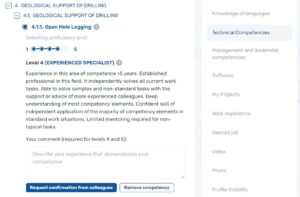
The requirements and detailed description of each Skill can be read by clicking the “?” icon.
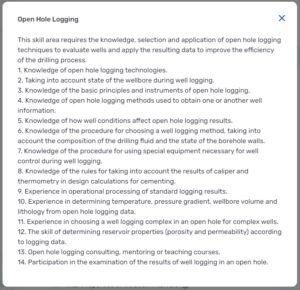
You can send a request for confirmation of professional skills when editing the My Competencies (Technical Competencies) section to any colleague by indicating his email address.
To confirm, the recipient (colleague) will need to register on the NetPetro platform. This is necessary to ensure objectivity and honesty in assessing the user’s skills and professional qualities.
Example:
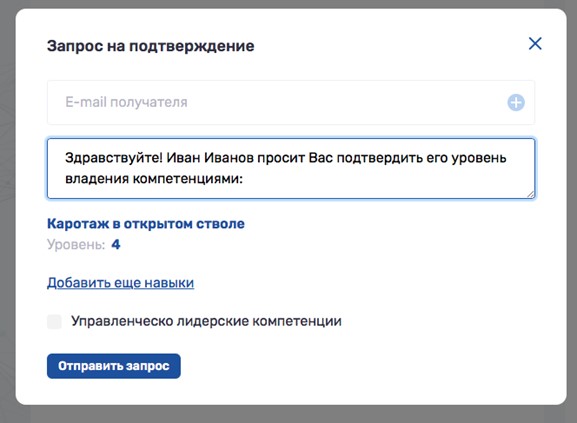
As a rule, a specialist has one basic competency with key skills in this area and a number of additional competencies acquired during the development of his own career.
A large number of core competencies (with skill levels from 3 to 5) specified by the user are likely to cause distrust in the profile and the specified data.
The management and leadership competencies assessment system consist of:
- Management and leadership competencies;
- Financial indicators of influence;
- Managerial and leadership qualities.
Regarding Management and Leadership Competencies and Financial Impact Indicators, the user has the opportunity to indicate/evaluate his best management skills/experience, add a comment/description revealing the details of the management experience gained.
Regarding managerial and leadership qualities, they are assessed exclusively by colleagues.
1. MANAGEMENT AND LEADERSHIP COMPETENCIES (rating scale from 1 to 10):
-
- Managerial level – the best position from all work experience, this item determines managerial experience;
- Number of employees in the organization – the number of employees in the organization from the best management experience, this item determines the size of the organization and the level of scale of its activities;
- Number of people directly subordinate – the number of people directly subordinate from the best experience, this item determines experience in the field of people management;
- Number of people in indirect subordination – the number of people in indirect subordination from the best experience; this item determines experience in the field of people management.
Example:
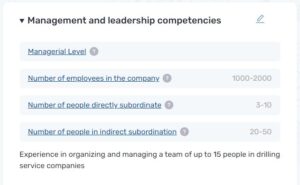
2. FINANCIAL IMPACT INDICATORS
-
- Level of financial influence – the approximate level of personal influence on the financial activities of an organization or project implementation based on best experience. For example, for a project manager, the level of influence will be equal to the cost of the project;
- Limit of financial responsibility – the amount of allowable expenses (contracts) per year that do not require corporate approval procedures (tenders, investment committees, etc.) based on best experience, if applicable. Not all companies apply financial liability limits in their practice;
- Scale/cost of implemented/ongoing projects/assets (current or previously implemented) – approximate cost of projects from best experience. This item determines the scale of projects.
Example:
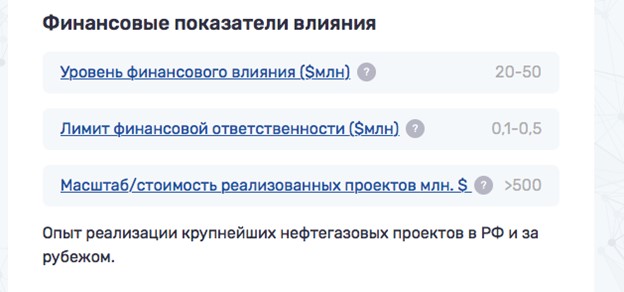
3. MANAGEMENT AND LEADERSHIP QUALITIES
-
- Assessment of management and leadership qualities is carried out by colleagues. Colleagues can choose only 4 of the 11 qualities that best suit the user. General statistics of the distribution of user qualities based on the assessment results will give a picture of the user’s strongest qualities.
- A request for confirmation of skills and professional qualities is sent by the user from his profile page.

You can send a request for an assessment of management and leadership qualities to any colleague by indicating his email address. To assess the user’s management and leadership qualities, the recipient (colleague) will need to register on the NetPetro platform. This is necessary to ensure objectivity and honesty in assessing the user’s skills and professional qualities.
Example:
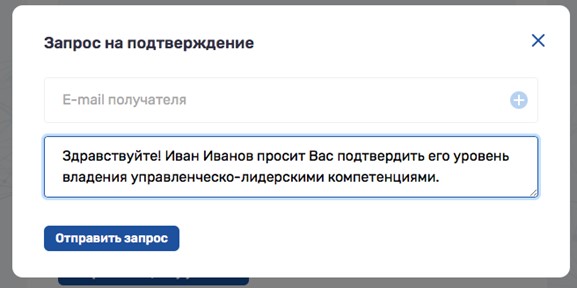
Eleven key qualities to evaluate:
- Strategic thinking
“Thinks big, identifies promising directions, takes into account a wide range of factors (economic, political, social, etc.), considers the situation in the long term, assesses trends, anticipates possible scenarios for the development of events and acts based on them.
— Understands high-level goals
— Determines long-term prospects for activity
— Understands his contribution and the contribution of his department to achieving long-term and strategic goals
— Determines the future needs of the organization
— Acts taking into account the future needs of the organization
— Monitors industry trends
— Demonstrates a broad vision, takes into account internal and external aspects of the organization’s functioning
— Links the team’s actions to the goals of the organization”;
- Teamwork
“The ability to be a team player, work for a joint result, understand your role and your contribution to the common cause. Necessary skills for developing competence are communication skills, system analysis and assessment, organization of working time
— Makes a tangible contribution to the work of the team, even if personal interests are not taken into account
— Demonstrates an understanding of the overall goal and how to achieve it
— Finds out and understands the points of view of team members
– Shows willingness to compromise
— Shows a willingness to share responsibility and rewards for results
— Creates an atmosphere of respect, mutual assistance and cooperation
— Able to form a team that takes into account everyone’s strengths to achieve synergy
— Inspires all team members to contribute to the development and achievement of goals
— Moderates and resolves conflicts within the team
— Provides clear feedback to all team members”;
- Result orientation
“Clearly represents the required result, takes responsibility for achieving the set goal, and initiates the necessary actions. Sets complex/ambitious tasks for himself and gives his own assessment of completed tasks.
— Creates a description of the final result, sets deadlines for its achievement
— Evaluates his own and others’ work by the result achieved, and not by the amount of time spent
— Takes on additional workload, authority and responsibility if necessary to achieve results
— Quickly gets involved in work, maintains a high pace of work
— Takes responsibility for making decisions within the scope of his authority
— If necessary, takes responsibility for making tough and unpopular decisions
— Independently, without waiting for instructions, initiates actions to achieve a goal
— Knows what goals need to be achieved
— Demonstrates high quality results the first time
— Focused on achieving high quality standards in work
— Does not keep silent about mistakes made, always takes responsibility for failures”;
- Development of subordinates
“Contributes to the development of others, provides developmental feedback, shares his knowledge.
— Assigns work tasks to the mentee/subordinate in order to develop skills and expand the scope of their responsibility
— Uses a variety of methods to develop the mentee/subordinate
— Willingly helps the mentee/subordinate with advice, shares expertise, acts as a mentor and coach when performing new/complex work tasks
— Coordinates development goals with the mentee/subordinate
— Monitors and notes progress in the development of professional and behavioral skills of mentees/subordinates
— Provides balanced feedback”;
- Leadership
“Accepts responsibility for the performance of others, motivates people and coordinates their work to achieve goals. He is the leader of a group, department, company and can influence the behavior of employees and colleagues.
— Responsible for the results of employees’ work
— Forms goals, evaluates completed tasks
— Motivates others to achieve goals
— Concentrates common efforts
— Forms team spirit
— Coordinates and delegates actions
— Closely monitors the level of motivation of others
— Uses tangible and intangible approaches to motivation, taking into account their individual characteristics
— Supports independent decisions of team members”;
- Analysis and problem solving
“Having strong skills: system analysis and assessment, operational search and systematization of data, rational thinking
— Analyzes the problem, searches for a solution based on available information
— Considers alternatives and offers the optimal solution
— Acts in such a way as to prevent similar situations from occurring in the future
— Searches for and analyzes best practices for solving problems
— Calm in the face of emerging problems
— Openly and consistently presents the problem, listens to questions asked
– Evaluates the truth and adequacy of assumptions and assumptions before the start of an activity, especially in those aspects where failures have already occurred
— When problems arise, does not waste resources searching for those responsible
— In case of failure, discusses the situation, learns lessons, draws conclusions, corrects behavior
— Fixes conclusions on solving the problem that has arisen, so as not to repeat the occurrence of similar situations”;
- Task management
“Draws up a comprehensive action plan to implement tasks. Organizes the company’s activities, predicts possible development options, sets priorities, evaluates resources (human, time, financial, etc.), determines deadlines for completing work and control measures.
— When making plans, takes into account possible changes and obstacles
— Ensures timely communication and coordination with other functions/organizations
— Carries out intermediate and final control over the completion of tasks
— Creates monitoring and control systems
— Correlates the planned result with the resources expended, finds the optimal option for distributing available resources (time, human, financial)
— Prioritizes work
— Clearly defines areas of responsibility between performers
— Breaks down final goals into tasks and transmits them to performers in advance
— Delegates tasks taking into account the level of the performer
— Highlights critical points and requirements and clearly communicates them to performers
— Develops a scheme/action plan to achieve the final goal
— Ensures timely completion of goals, adheres to plans and schedules”;
- Focus on development
“Expressed internal readiness to acquire new knowledge and skills, activity in achieving goals and an active life position, self-control, the ability to achieve goals regardless of favorable external conditions, a tolerant attitude towards failures and the intention to overcome them constructively”;
- Focus on high standards
“Having strong skills: system analysis and assessment, ability to think rationally, responsibility
— Sets high standards of excellence for himself and others
— Makes efforts to improve the quality of the task performed
— Shows dissatisfaction with the low level of completed tasks
— Develops responsibility and commitment in the team
— Teaches employees to independently check the quality of their work
— Controls the quality during the work process, as well as the quality of intermediate results
— Always does quality work, even if the result depends on the team
— Takes responsibility for problems and actively seeks ways to solve them
— Does not hide his mistakes, analyzes them and makes efforts to avoid them in the future
— Introduces modern quality management technologies”;
- Understanding the business
— Knowledge of the specifics of the company’s work, its competitive advantages, market positions and strategic priorities. Understanding internal business processes and your role in their implementation”;
- Business ethics
“Commitment to the highest standards of ethical behavior in work and everyday life
— Compliance with laws and regulations, including industry and corporate rules, standards, procedures
— Social responsibility, including environmental protection, professional health management
— Morality, honesty, fairness, respect and decency
— Partnership, mutually beneficial cooperation, mutual respect and responsibility for fulfilling obligations”.
The 7I standard, implemented in NetPetro, allows the user to present their knowledge, skills, qualities, successes, achievements, and work experience as deeply and comprehensively as possible.
Preparing a successful profile will require effort, perhaps more than one day. But it’s worth it!
The format for filling out the profile involves filling out the sections sequentially:
- Contact information;
- Education;
- Knowledge of languages;
- My competencies;
- My projects;
- Work experience;
- Desired job;
- Video;
- Photo;
- Profile visibility.
You can send a request for confirmation of professional skills when editing the My Competencies (Technical Competencies) section to any colleague by indicating his email address.
To confirm, the recipient (colleague) will need to register on the NetPetro platform. This is necessary to ensure objectivity and honesty in assessing the user’s skills and professional qualities.
Example:
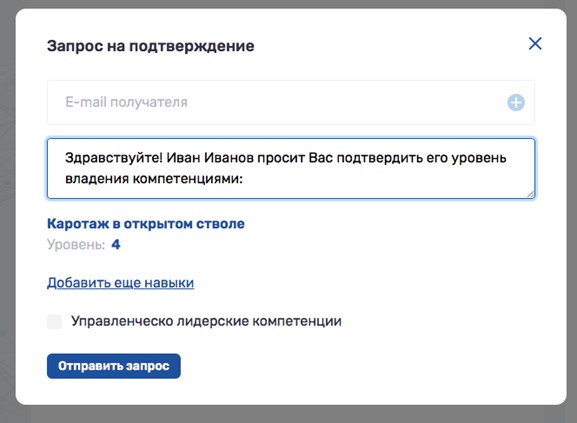
Assessment of management and leadership qualities is carried out by colleagues. Colleagues can choose only 4 of the 11 qualities that best suit the user. General statistics of the distribution of user qualities based on the assessment results will give a picture of the user’s strongest qualities.
A request for confirmation of skills and professional qualities is sent by the user from his profile page.

You can send a request for an assessment of management and leadership qualities to any colleague by indicating his email address. To assess the user’s management and leadership qualities, the recipient (colleague) will need to register on the NetPetro platform. This is necessary to ensure objectivity and honesty in assessing the user’s skills and professional qualities.
Example:
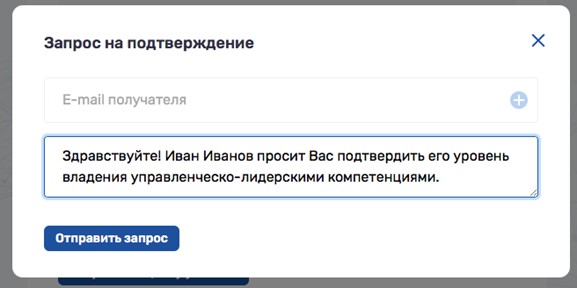
Success is an integral part of any person’s career. Success is what we strive for throughout our professional lives.
Therefore, it is important to be able to present your success to others. Our achievements are proof of our success.
Everyone has achievements in any period of professional activity. It is important to simply present them correctly.
NetPetro gives you the opportunity to describe your achievements in the Work Experience section. At the same time, further all the achievements described in the Work Experience section are formed into a separate section of the User Profile – Achievements. This allows you to present the most striking successes in the user’s career in one place.
The most valuable experience and skills of an expert is experience in participating in significant projects. Such experience allows you to develop strong teamwork skills, strengthen leadership qualities, and gain irreplaceable experience and skills in organizing project activities. Therefore, specialists with experience in large and significant projects are most highly valued on the market.
When hiring a candidate for a certain position, it is the experience of participation in significant projects that makes a decisive contribution when making a decision.
NetPetro allows you to reveal the detailed experience of a specialist’s participation in large and significant projects and provide the most detailed description of the project and his own role, achievements in this project.
The structure of the substantive part of the project description allows you to describe any project as deeply and effectively as possible. On the one hand, the structure helps to structure the description of the project, on the other hand, it does not require strict adherence to the requirements for filling out all sections.
The NetPetro search system allows you to further search for experts through project data by region, name, cost, area of application, participating companies, etc.
The structure of project descriptions is as follows:
PROJECT INFORMATION
- Scope of the project (GEOLOGY, GIS AND CORE, SEISMIC, DRILLING, RESERVOIR DEVELOPMENT, GROUND INFRASTRUCTURE, OIL AND GAS PRODUCTION, WORKover AND WELL TECHNOLOGY, ENERGY, etc.);
- Project location;
- Years of participation/work in the project;
- Project cost, $mln;
- Project description (Project customer, Project participants, Detailed information about the project, Implementation deadlines, Production schedules, Project resources, Project roadmap, Project cost and financing schedules);
- Project economics (NPV, IRR%, Risks);
- Related projects;
ROLE OF YOUR COMPANY IN THE PROJECT
- Role in your organization’s project;
- Field of activity (yours or your organization);
- About the Company (description);
- Companies associated with the project;
PERSONAL ROLE IN THE PROJECT
- Level in the organization (position held);
- Achievements and Personal role in the project.
NetPetro allows you to find a specialist both by keyword and by detailed search according to a specific criterion:
- Technical competencies;
- Software;
- Citizenship;
- Work experience (country);
- Experience;
- Knowledge of languages;
- Name of the organization;
- Name of educational institution;
- Project name;
- Administrative and managerial indicators of influence;
- Financial indicators of influence;
- Scale/cost of implemented/ongoing projects/assets.
There are two ways to include colleagues in your contact list:
- On the initiative of your colleague. If your colleague sent you a request through the Netpetro system (to your E-mail used in the Netpetro system) (any request: for feedback, for confirmation of competencies, etc.), then it will automatically appear in your “Contacts” section.
- On your initiative. If you are a potential employer or recruiter, then you can purchase the contact of a specialist of interest found in the Netpetro system. When purchasing user contact information, his profile will automatically be saved in your “Contacts” section.
